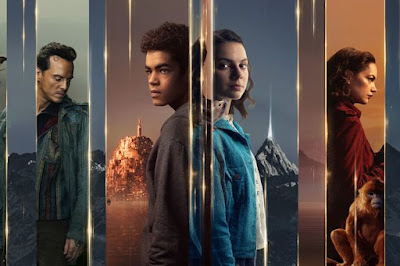Fighting back - His Dark Materials and The Handmaid's Tale
His Dark Materials
I've been seeing really annoying spoilers for weeks about the final series of Phillip Pullman's perfect trilogy, as for some reason it was released earlier in the US, a week at a time. So, I already knew a little bit of what to expect, and when the series dropped on iplayer on Sunday, I started watching straight away, with a plan to watch two episodes a night. Well that lasted on Sunday and Monday but last night, at the end of episode 6 I just couldn't stop and so tore on through right to the end. I think this production has done the books proud, in a way that The Golden Compass just didn't. For a start the right people are British, and there was enough time to tell the story properly enough that I didn't feel there were any glaring holes, although there were some changes made. One of the good things was the way that the large chunks of philosophy in the last book of the series, The Amber Spyglass, was spread out very effectively throughout. By and large the special effects and the daemons and creatures were believable too. And that scene between Lyra (Dafne Keen) and Pan (Kit Connor) in episode 4 was beautiful and heartbreaking. I don't think even David Attenborough has made me cry about a CGI pine marten before.
All three series have had the same really detailed and comprehensive intro sequence which brings to life the idea of the multiverse really well and most of the themes that are going to be covered. I find myself choosing to watch it rather than 'skip intro' more often than not, just for the joy of it. If you know nothing about the books or the series, then probably a simple description is religious myths and authoritarianism smashed against rationalism and science in a multiverse to see what happens through the eyes of a couple of teenagers. The fact that it is children who are able to fight back is important here for the narrative and themes, but increasingly I think in the real world Generation Z are our best hope to save the world aren't they?
The religious authoritarianism is instantly recognisable, and although many of the themes are a picking apart of Christian myths, the fanaticism could be from any major religion with too much power. And it is no leap to see that there isn't any need for a religion, just an unswerving belief in the rightness of your position. I also like the balance showing the fanaticism of the scientific zealot, encapsulated with an increasingly manic but chunky energy by James McAvoy. All are heroes and villains depending on your point of view, but as Lyra says, good people have doubts. Bearing that in mind, the casting of Ruth Wilson as Mrs Coulter was a stroke of genius and her unpacking of the character over the three series, keeping us on our toes with her real motives, was an absolute joy to watch.
I love the merging of philosophy, science and myth in these stories, but the overarching humanity of Lyra and Will (Amir Wilson) are what pulls all of this together. I wasn't convinced originally of the casting for this, but the last time I read the books, it was Dafne and Amir I saw in my mind, so it's pretty clear that they knew what they were doing.
There's so much more I could talk about, but the final couple of episodes brought the whole sprawling narrative and themes together really well. And I spent a fair bit of it in bits, with the cats looking at me in bemusement. In my hurry to devour the whole series, even though I knew what was coming, I hadn't really prepared for that ending with its quiet, devastating pragmatism. Probably going to watch it again now.
The Handmaid's Tale
This week the last two episodes of The Handmaid's Tale hit Channel 4, and under the misapprehension they were the last of the final season I obviously had an appointment to view. The book continues to be a favourite, but after series1, the tv show has been sort of heading in its own direction. When the first series landed it felt like Trump's America had been brought to life, and the slippery slope to the unravelling of pretty much all human rights felt far too real. Although it is slower, when you look at the attacks on abortion and LGBTQ+ rights in real life I think we are still on that slope, we just haven't reached the bit where it is too late to turn around. Although the final episode in this tranche did a good job of reminding us that you never think it is too late to run until it is.
As always Elisabeth Moss does a great job of being indestructible but human and I continue to enjoy Bradley Whitford's moral ambiguity (plus I still have a bit of a crush on him from his West Wing days so am always giving him far too much benefit of the doubt). I've enjoyed the complexity of June's relationship with Serena this series and the little treat at the very end of the final episode before Christmas. What next? I'm hoping that Aunt Lydia will become an avenging angel for her 'girls', swinging a sharpened version of her walking stick as she goes. Fingers crossed.
So, two different versions of fighting back against authoritarianism. Do you think there is a message there for us somewhere we should be paying attention to?



Comments
Post a Comment